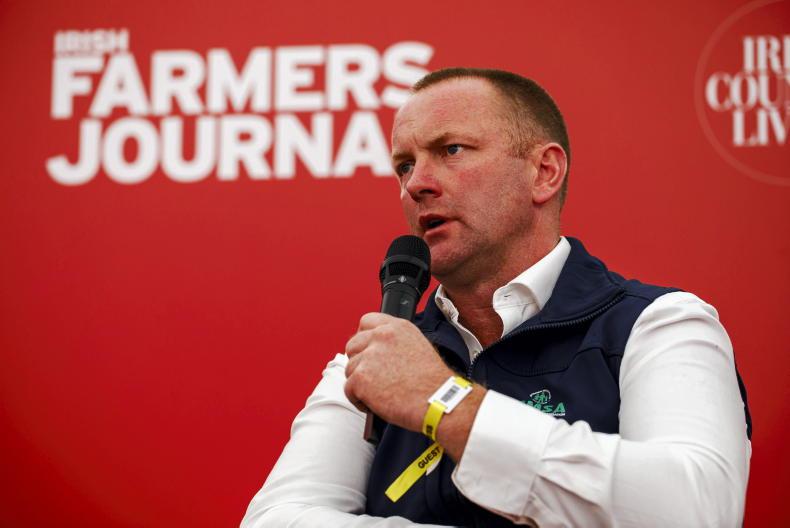Getting a mortgage is a headache for many but it can be even more so for farmers. The inherent volatility of farming and uncertainty surrounding annual income makes the mortgage application process a much more difficult task.
Successfully drawing down a mortgage as an employee is less complex as the person receives a gross wage on which the lender will typically grant a multiple of four times their gross annual salary. However, farming is not as straightforward, with prices dictated by the market. Milk prices, grain prices and beef prices are fluctuating constantly along with input prices which invariably impact the farm level’s net profit each year.
Getting your paperwork ready
The paperwork for a mortgage application is relatively straightforward. The standard requirements include:
• Six months current account
statements.
• Six months saving accounts
statements.
• Six months investment and
borrowing statements.
• If renting, a copy of the lease agreement.
The above applies to everyone applying for a mortgage. Employees are required to provide the bank with their three most recent salary slips and a salary certificate from their employer as a minimum.
For farmers registered as a sole trader, partnership, or limited company, this is where your farm income and the unpredictability of farming comes in to play.
A farming entity further requires:
• Two years most recent audited or trading accounts certified by your accountant.
• Two most recent revenue
acknowledged Form 11s if applicable.
• Six months recent business current accounts.
• Six months recent business borrowing statements.
• Confirmation that your tax is up to date from your accountant.
How much can I borrow?
The above documentation is required by your bank. However, the most important question on everyone’s mind is how much can I borrow? As stated above, an employee can receive up to four times their yearly gross salary.
For example, if you are on €30,000 a year, you can receive a mortgage of €120,000 if you are a sole applicant. For farming, everything is based on repayment capacity. Your average profit is the main driver in repayment capacity with trading structure being a close second.
Current business loans and other leverage also come into effect here as it will reduce free cash flow and alter repayment capacity. Take a look at our example for Sean O’Leary in the box below as a further explanation.
Can I improve my repayment capacity?
If repayment capacity is key to getting a mortgage while farming, how can you improve it? It can seem a tricky task but a few straightforward steps could make all the difference.
1 Loan repayments tend to be a large factor impacting mortgage approval. If you intend on applying for a mortgage and have loan repayments hanging around, it’s a good idea to clear these if funds allow.
Take Sean’s example in box one below where loan repayments are €10,000 – if these were cleared, it would free up a further €10,000 free cash flow allowing for an extra €40,000 to be borrowed (because you multiply it by the mortgage multiple of four times the income).
2 Regular savings are also a big plus when looking to boost your repayment capacity. If you have regularly saved €500 a month for several months or years this will improve your application regardless of your profitability.
If you are planning on applying for a mortgage over the coming months and haven’t been saving as of late, I recommend you start saving as soon as possible on a regular basis. A one-off lump sum is not regular savings and it is very important to make these more regularly, as it demonstrates capacity to save which is a key factor when you draw down a loan.
What to do If you have been rejected
Being rejected for the mortgage you want is not the end of the world, although you may be disappointed at the time. If you’re not able to get the mortgage right now, perhaps it is time to take a proper look at your personal and business finances.
Sitting down to plan the next 12 months and pinpointing the areas for improvement could be the building blocks for your future. These might include areas such as loan reduction, regular saving and of course, improving your business’s overall profitability.
Speak to another bank, your accountant or a mortgage broker – these people are in the game every day of the week and will know the simple tweaks necessary for you to get over the line and into approval territory.
It is important to be patient and plan accordingly. If you are in a partnership
on a lower profit share while doing 50% of the work or more, it may be time to have a conversation with your partner and possibly adjust the partnership profit share. This will reflect the work you are putting in while also increasing your profitability and therefore, your repayment capacity.
Mortgage applications can be a daunting task, however like many things in life, minor changes can result in major opportunities.
Jerry O’Neill is a qualified ACCA
accountant based in Bandon, Co Cork.
If you have a query for Jerry, email
advice@farmersjournal.ie
Examples of a dairy farmer looking for a mortgage
• Example 1: Sean O’Leary is a dairy farmer with a business profit of €80,000 each year. Typically, there is a minimum requirement of €17,000 to cover day-to-day living expenses. With €10,000 worth of loan repayments and €10,000 tax, this reduces his free cashflow to €43,000.
The lender will stress test the income to ensure if a crash or his personal farming enterprise takes a turn for the worst, he can still repay your mortgage.
In this example after stress testing, his free cash flow is reduced to €35,000 which reduces his repayment capacity further.
Sean is a first-time buyer, so he will be approved for four times his salary.
This means his approval is €140,000 (€35,000 x 4).
• Example 2: It is important to note that any off-farm income can also be combined with the farm income. Let’s work this example out further.
Sean is married to Denise who is a teacher in the local school and has a salary of €45,000.
As first-time buyers, Denise can also be approved for fourtimes her salary.
This means her approval is €180,000 (€45,000 x 4). In total, Sean (€140,000) + Denise (€180,000) means the couple would be approved for €320,000.
Getting a mortgage is a headache for many but it can be even more so for farmers. The inherent volatility of farming and uncertainty surrounding annual income makes the mortgage application process a much more difficult task.
Successfully drawing down a mortgage as an employee is less complex as the person receives a gross wage on which the lender will typically grant a multiple of four times their gross annual salary. However, farming is not as straightforward, with prices dictated by the market. Milk prices, grain prices and beef prices are fluctuating constantly along with input prices which invariably impact the farm level’s net profit each year.
Getting your paperwork ready
The paperwork for a mortgage application is relatively straightforward. The standard requirements include:
• Six months current account
statements.
• Six months saving accounts
statements.
• Six months investment and
borrowing statements.
• If renting, a copy of the lease agreement.
The above applies to everyone applying for a mortgage. Employees are required to provide the bank with their three most recent salary slips and a salary certificate from their employer as a minimum.
For farmers registered as a sole trader, partnership, or limited company, this is where your farm income and the unpredictability of farming comes in to play.
A farming entity further requires:
• Two years most recent audited or trading accounts certified by your accountant.
• Two most recent revenue
acknowledged Form 11s if applicable.
• Six months recent business current accounts.
• Six months recent business borrowing statements.
• Confirmation that your tax is up to date from your accountant.
How much can I borrow?
The above documentation is required by your bank. However, the most important question on everyone’s mind is how much can I borrow? As stated above, an employee can receive up to four times their yearly gross salary.
For example, if you are on €30,000 a year, you can receive a mortgage of €120,000 if you are a sole applicant. For farming, everything is based on repayment capacity. Your average profit is the main driver in repayment capacity with trading structure being a close second.
Current business loans and other leverage also come into effect here as it will reduce free cash flow and alter repayment capacity. Take a look at our example for Sean O’Leary in the box below as a further explanation.
Can I improve my repayment capacity?
If repayment capacity is key to getting a mortgage while farming, how can you improve it? It can seem a tricky task but a few straightforward steps could make all the difference.
1 Loan repayments tend to be a large factor impacting mortgage approval. If you intend on applying for a mortgage and have loan repayments hanging around, it’s a good idea to clear these if funds allow.
Take Sean’s example in box one below where loan repayments are €10,000 – if these were cleared, it would free up a further €10,000 free cash flow allowing for an extra €40,000 to be borrowed (because you multiply it by the mortgage multiple of four times the income).
2 Regular savings are also a big plus when looking to boost your repayment capacity. If you have regularly saved €500 a month for several months or years this will improve your application regardless of your profitability.
If you are planning on applying for a mortgage over the coming months and haven’t been saving as of late, I recommend you start saving as soon as possible on a regular basis. A one-off lump sum is not regular savings and it is very important to make these more regularly, as it demonstrates capacity to save which is a key factor when you draw down a loan.
What to do If you have been rejected
Being rejected for the mortgage you want is not the end of the world, although you may be disappointed at the time. If you’re not able to get the mortgage right now, perhaps it is time to take a proper look at your personal and business finances.
Sitting down to plan the next 12 months and pinpointing the areas for improvement could be the building blocks for your future. These might include areas such as loan reduction, regular saving and of course, improving your business’s overall profitability.
Speak to another bank, your accountant or a mortgage broker – these people are in the game every day of the week and will know the simple tweaks necessary for you to get over the line and into approval territory.
It is important to be patient and plan accordingly. If you are in a partnership
on a lower profit share while doing 50% of the work or more, it may be time to have a conversation with your partner and possibly adjust the partnership profit share. This will reflect the work you are putting in while also increasing your profitability and therefore, your repayment capacity.
Mortgage applications can be a daunting task, however like many things in life, minor changes can result in major opportunities.
Jerry O’Neill is a qualified ACCA
accountant based in Bandon, Co Cork.
If you have a query for Jerry, email
advice@farmersjournal.ie
Examples of a dairy farmer looking for a mortgage
• Example 1: Sean O’Leary is a dairy farmer with a business profit of €80,000 each year. Typically, there is a minimum requirement of €17,000 to cover day-to-day living expenses. With €10,000 worth of loan repayments and €10,000 tax, this reduces his free cashflow to €43,000.
The lender will stress test the income to ensure if a crash or his personal farming enterprise takes a turn for the worst, he can still repay your mortgage.
In this example after stress testing, his free cash flow is reduced to €35,000 which reduces his repayment capacity further.
Sean is a first-time buyer, so he will be approved for four times his salary.
This means his approval is €140,000 (€35,000 x 4).
• Example 2: It is important to note that any off-farm income can also be combined with the farm income. Let’s work this example out further.
Sean is married to Denise who is a teacher in the local school and has a salary of €45,000.
As first-time buyers, Denise can also be approved for fourtimes her salary.
This means her approval is €180,000 (€45,000 x 4). In total, Sean (€140,000) + Denise (€180,000) means the couple would be approved for €320,000.










SHARING OPTIONS